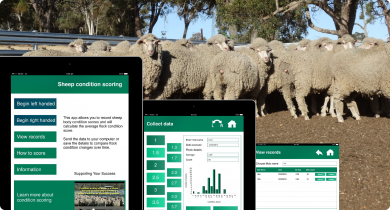Livestock management
Management of livestock must take into account variable seasonal factors, fluctuating markets and declining terms of trade. The most successful producers have a good knowledge of market requirements, matching product quality to suit. There are many factors that can determine the productivity and profitability of a livestock enterprise. These include the supply and quality of feedstuffs, the use of the most appropriate genetics, ensuring high health standards, optimising housing or environmental conditions, meeting quality assurance requirements, and having a sound knowledge of market requirements. This requires good communication along the value chain.
The Department of Primary Industries and Regional Development has technical expertise in a range of areas related to livestock management but acknowledges that there are many other sources of information that producers should be encouraged to seek out. There are many grower groups who play an important role in encouraging discussion amongst producers to improve adoption of new technology, as do private consultants and university scientists.
See Also
Articles
Filter by search
Filter by topic
- (-) Remove Emergency animal disease preparedness filter Emergency animal disease preparedness
- Livestock health & diseases (3) Apply Livestock health & diseases filter
- Pests, weeds & diseases (3) Apply Pests, weeds & diseases filter
- Biosecurity & quarantine (3) Apply Biosecurity & quarantine filter
- Livestock biosecurity (3) Apply Livestock biosecurity filter
- Biosecurity (3) Apply Biosecurity filter
- (-) Remove Diseases filter Diseases
- (-) Remove Emergency response filter Emergency response
- Wildlife biosecurity (2) Apply Wildlife biosecurity filter
- Livestock species (2) Apply Livestock species filter
- Livestock disease surveillance (2) Apply Livestock disease surveillance filter
- Livestock movement & identification (2) Apply Livestock movement & identification filter



